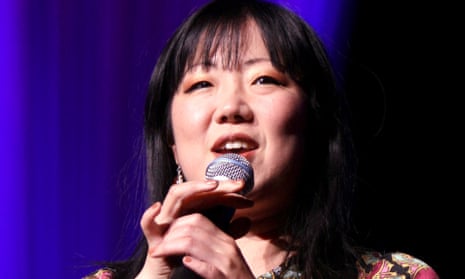Rebecca Lehrer is a Salvadoran Jewish American who married an “American-American”. Amy Choi is a Korean American who married a Colombian Mexican American and gave birth to a child she dubbed a “Korombexican-American”.
Such diverse heritage, which they believe is the future of the great melting pot that is America, lies at the heart of their new podcast, The Mash-Up Americans, in which the pair explore culture, identity, tech, news and, of course, food.
Why you should listen
If you’re Scottish and looking for ways to celebrate Diwali with your in-laws; if you need ideas on how to pay homage to your Filipino and Chinese heritage while preparing your Christmas feast; or if you ever find yourself explaining to your child that his family tree has roots in Japan, England, Russia and Mexico … The Mash-Up Americans podcast is for you.
The newly minted podcast explores what it means to live in the melting pot culture of the United States. Founded by Choi and Lehrer, the show looks at how cultures coexist within society, families, and individuals.
“When Amy and I met, we talked a lot about families and getting married and having kids and we realized that we had a real affinity, even though she is Korean American and I am a Salvadoran Jewish American,” said Lehrer.
“There was just a universality to the experiences.”
But despite the rapidly growing population of people with incredibly diverse cultural backgrounds, Lehrer and Choi found that few people were really talking about the issues that could arise when one is trying to juggle multiple cultures within a single family.
“We realized that around us, many people we knew were struggling with these same issues about: how do you plan an interfaith marriage or even a funeral when you’re family has really different beliefs? How do you decide what to name your kid? How do you deal with in-laws? How do you navigate that?” Lehrer said.
“No one was really telling these stories, so we decided to focus on all these moments when culture and identity become really critical conversations.”
The podcast is an offshoot of their popular website of the same name, where they discuss those occasionally thorny topics that arise in a multicultural world. The website features a carefully curated mix of pop culture, news, and personal narratives.
“We want to feature what people are talking about this week, whether it’s a Washington Post article on how to save miso to an article on ‘Obama’s blackest moments’,” said Lehrer. “We like to have a variety.”
They’ve covered topics like conflicting cultural beauty standards; why 90% of doughnut shops in California are owned by Cambodians; coming of age as a Chinese Jew; why you shouldn’t be surprised by a Hindu nativity scene; and what to do with leftover Easter eggs when you’re Indian.
They are diverse topics for an incredibly diverse culture.
“Nowhere has the same level of genetic diversity as the Americas,” said Lehrer. “It’s pretty uniquely American.”
The site also features interviews with notable Mash-Up Americans like Radiolab host Jad Abumrad, podcaster and Das Racist frontman Ashok Kondabolu and Match.com chief scientist Helen Fischer about what makes a successful mash-up marriage.
Lehrer expects that their podcast will follow a similar format. In the show’s second episode, they spoke with Korean American comic Margaret Cho about Bill Cosby and what he meant in the 1960s to people of color.
“The way she talked about that was very enlightening,” said Lehrer.
They also talked about Cho’s family and their accents, and her feelings about Whole Foods kimchi and making fun of her mom’s accent.
“She was embarrassed that her Korean isn’t very good,” said Lehrer. “That’s something we talk about a lot, about the guilt of not being able to communicate in our parents’ tongue – and it felt so good to hear Margaret Cho speak about that.”
While both Choi and Lehrer are newcomers to podcasting (“I never thought I would be a host,” laughed Lehrer) they don’t tend to shy away from controversial topics like religion and politics. Their debut episode featured an exploration of Donald Trump, revealing that even a presidential candidate whose platform is decidedly anti-immigration is a mash-up American in his own right.
“We believe the mash-up of America is what makes it a great place and what we should be celebrating,” said Lehrer.
“We wanted to respond to Donald Trump, but not too academically or journalistically or too seriously, but with our take as a mash-up. It turns out his mom is an immigrant from Scotland, his grandparents came from Germany, and he had a typical amazing immigration story.”
Future episodes include tips on “how to be the best non-Jew at the Hanukah party”, as well as a conversation with a geneticist about how mashed up they really are, interviews with fascinating mash-ups, a chat with a population scientist, and, of course, dating advice from immigrant parents. It’s a mash-up, but what else would you expect?
Where to start: The Mash-up Life of Donald Trump, To Margaret Cho We Go
- Subscribe to The Mash-Up Americans on iTunes

Comments (…)
Sign in or create your Guardian account to join the discussion